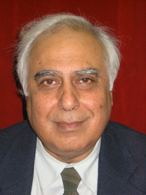 Improving the quality of education is the greatest challenge before the government, Human Resource Development Minister Kapil Sibal tells Sreelatha Menon.
Improving the quality of education is the greatest challenge before the government, Human Resource Development Minister Kapil Sibal tells Sreelatha Menon.
The Right to Education Act raises the issue of access to good quality education for all. What are your plans?
It is the biggest challenge we face in the country and I am going to address it separately in a huge way. This will be the first issue to be taken up at the round-table on school education that I have set up.
Lack of enough teachers will puncture any attempt to ensure equal access to education for all. How will you resolve this?
I am giving the states five years to do this. Five years is sufficient time to get enough teachers.
How will the government ensure monitoring of schools? Is anything being planned? Even during the British period, there was a system of monitoring.
We will have an accreditation process in place. We will have a system to evaluate teachers.
But since education is a state subject, can you enforce these things?
We will enforce only where we can.
There may be a reason why central schools and Navodaya schools have done well and have been able to retain students and maintain quality.
I think one of the reasons is that these are government schools catering to government servants. Among government servants, there is a greater emphasis on education. Therefore, teachers in these schools are monitored by parents. The structure of central schools has a direct relationship with quality. We can't replicate it but we have to evolve another way to ensure the same impact.
The issue of minority-run institutions being exempt from 25 per cent reservation for weaker sections has created a lot of problems in Kerala. Do you foresee a similar problem in other parts of the country, since you have not exempted these institutions from quotas?
I have to call a separate meeting on the Kerala issue. But, in general, under the Right to Education Act, I have decided to leave it to the courts to decide on minority institutions. If it is against the Constitution, the courts will say so. I am not saying anything now. But in the original draft of the Act which I made, this issue was subject to Article 30.
This provision was removed in later drafts. Now, when the Act is amended, this will be added again. Under Article 30, a minority management has the right to manage, not mismanage, a right to administer, not to mis-administer.
Bribery is rampant in the education sector, so much so that people have to pay to get their children admitted to schools, as well as to get appointed as teachers. This affects quality. Is the ministry planning to act on this front?
Where institutions are unaided, we are helpless. We are thinking of a system where we can directly pay teachers. When we have the unique identification number (UID), this will become a reality as 310 million people will be covered by the school system alone. Then, salaries and perks can be paid directly to teachers.
Is the ministry planning a separate scheme with UID? How can it stop absenteeism or prevent teachers from hiring someone else to do their job?
We will have the biggest UID programme in our ministry. I am meeting Nandan Nilekeni for a whole day to look at the school and college system and to see how the project can be used to check the dropout rate and to track students and teachers. We are also looking at ways to track absentees.
The strike by the IIT teachers revealed the gulf between the ministry and these institutions. Have you decided to increase the funds for their salaries to resolve their pay-rise issue?
There was nothing to resolve on salaries. The budget for IITs remains the same. They have the flexibility and we have made it clear to them that the government will support everything that ensures their autonomy.
Will the madrassa board become a reality soon?
It has to, as it was one of the recommendations of the Sachar Committee. I have met minority members of Parliament (MPs) and will soon meet Minority institutions to get their views. We have already got the approval of the Central Advisory Board on Education, which has supported the move. There has to be a separate board run by them, not us, so that students can get a degree similar to the CBSE one and then move to polytechnics, universities and so on.
Have you seen the website of the National Open School? It asks for a dozen documents for admission to school courses and is in English. How can it help the thousands of dropouts who can benefit from it?
I have not seen it. The distance education policy is on the website and, according to it, the open school programme can be adopted by any institution. So, they can then help dropouts access these courses. Besides, I cannot visit all issues in such a short time even if I try to. I can't do it in three years, not even in five years.
Professor Yash Pal recently objected to the ministry's plans for agricultural universities and medical universities being left out of the ambit of the higher education commission.
All these matters are still being decided. It is too early to talk about them.
When will we have the first IIT which teaches humanities and agriculture as well as other subjects?